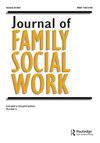Fidelity and sustainability in evidence-based treatments for children: An investigation of implementation determinants
IF 0.7
Q3 SOCIAL WORK
引用次数: 7
Abstract
ABSTRACT In order to improve access to and utilization of high-quality children’s mental health services, there have been considerable efforts to disseminate evidence-based treatments (EBTs) into community-based settings. However, these efforts have not always led to successful use of interventions overtime, and further understanding of how organizational and individual factors may serve as barriers to the implementation process is needed. To help measure implementation and sustainability success in a sample of 118 community-based mental health providers, a 70-item electronic survey was developed to query participant’s experiences with EBT implementation post-training. Results of hierarchical regression analysis suggest that more positive attitudes toward evidence-based practices, the provision of agency incentives, and more intensive training of the intervention increase the likelihood of EBT sustainability, while more positive attitudes toward evidence-based practice and more intensive training increase the likelihood that strategies to help promote protocol fidelity are used. Results contribute to the growing implementation literature in mental health. Post-training consultation may help increase a provider’s ability to manage organizational barriers inherent to providing EBTs within community-based settings. Provision of agency incentives, such as praise and financial compensation, as well as helping promote trainee’s positive attitudes toward EBTs, may also help increase likelihood of implementation success.儿童循证治疗的保真度和可持续性:实施决定因素的调查
摘要为了改善获得和利用高质量儿童心理健康服务的机会,已经做出了相当大的努力,在社区环境中传播循证治疗。然而,这些努力并不总是导致干预措施的成功使用,需要进一步了解组织和个人因素如何成为实施过程的障碍。为了帮助衡量118名社区心理健康提供者的实施和可持续性成功,开发了一项70项电子调查,以询问参与者在培训后实施EBT的经验。分层回归分析的结果表明,对循证实践、机构激励措施的提供和干预措施的强化培训持更积极的态度,会增加EBT可持续性的可能性,而对循证实践更积极的态度和更深入的培训增加了使用有助于提高协议保真度的策略的可能性。研究结果有助于不断增长的心理健康实施文献。培训后咨询可能有助于提高提供者管理在社区环境中提供EBT所固有的组织障碍的能力。提供机构激励措施,如表扬和经济补偿,以及帮助促进受训者对EBT的积极态度,也可能有助于提高实施成功的可能性。
本文章由计算机程序翻译,如有差异,请以英文原文为准。
求助全文
约1分钟内获得全文
求助全文
来源期刊

Journal of Family Social Work
SOCIAL WORK-
CiteScore
2.10
自引率
0.00%
发文量
4
期刊介绍:
Each issue of the Journal of Family Social Work contains peer reviewed research articles, conceptual and practice articles, creative works, letters to the editor, and book reviews devoted to innovative family theory and practice subjects. In celebrating social workers" tradition of working with couples and families in their life context, the Journal of Family Social Work features articles which advance the capacity of practitioners to integrate research, theory building, and practice wisdom into their services to families. It is a journal of policy, clinical practice, and research directed to the needs of social workers working with couples and families.
 求助内容:
求助内容: 应助结果提醒方式:
应助结果提醒方式:


